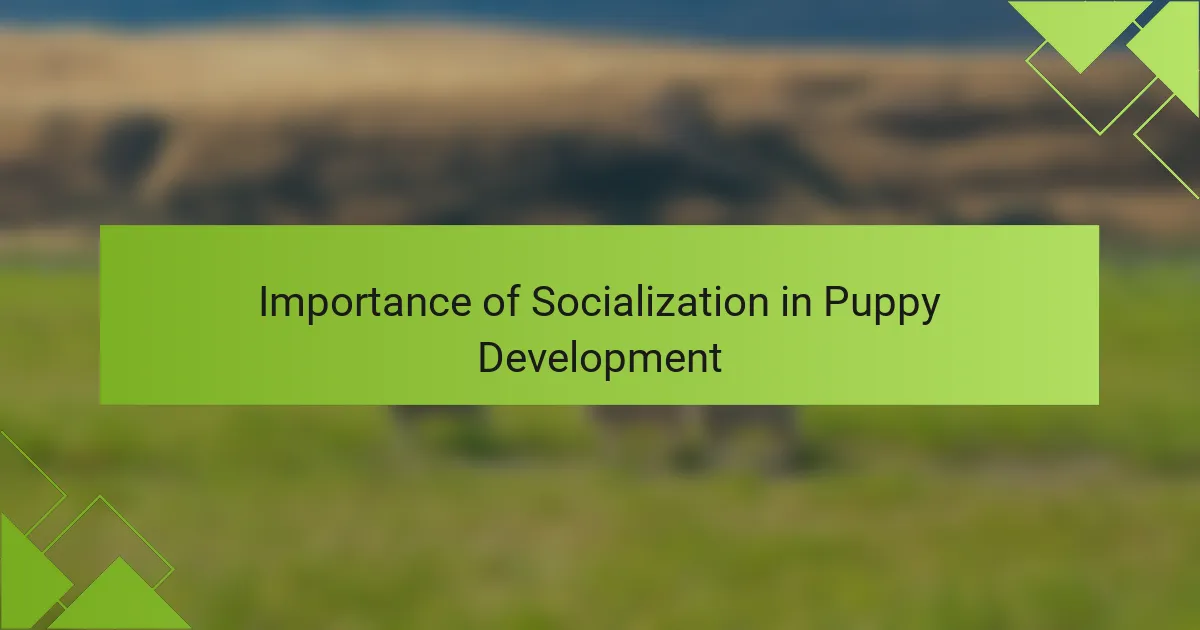Socialization is essential for puppy development as it fosters confidence and reduces behavioral issues. Early exposure to diverse people, pets, and environments enhances adaptability and emotional well-being. Effective methods include structured puppy classes and regular playdates, while positive reinforcement encourages calm behavior. Understanding breed-specific socialization needs further tailors these efforts for optimal results.

Why is Socialization Crucial for Puppy Development?
Socialization is crucial for puppy development because it fosters confidence and reduces behavioral issues. Early interactions with various people, pets, and environments help puppies learn appropriate social cues. This exposure can lead to better adaptability and a well-rounded temperament in adulthood. Studies show that properly socialized puppies are less prone to anxiety and aggression. Engaging in positive experiences during the critical socialization period enhances their emotional well-being and strengthens the human-animal bond.
What are the Key Benefits of Early Socialization?
Early socialization provides essential benefits for puppy development, including improved behavior, reduced anxiety, and enhanced adaptability. Socialized puppies tend to be more confident and less fearful in new situations. They learn vital skills for interacting with other dogs and people, which can prevent behavioral issues later in life. Additionally, early exposure to various environments fosters resilience and helps puppies become well-rounded adult dogs.
How Does Socialization Impact Behavioral Traits?
Socialization significantly shapes behavioral traits in puppies by fostering essential skills and reducing anxiety. Early interactions with humans and other animals help develop confidence, adaptability, and social skills. For example, well-socialized puppies are less likely to exhibit aggression or fearfulness later in life. Studies show that puppies exposed to diverse environments and experiences before 16 weeks are more likely to become well-adjusted adults. This critical period of development emphasizes the importance of positive socialization experiences in shaping a puppy’s future behavior.
When Should Socialization Begin in Puppies?
Socialization in puppies should ideally begin between three to fourteen weeks of age. Early socialization is crucial for developing a well-adjusted adult dog. During this period, puppies are more receptive to new experiences, people, and environments. Engaging with various stimuli helps prevent behavioral issues later in life. Studies show that properly socialized puppies are less likely to develop anxiety and aggression as adults.

What Methods are Effective for Socializing Puppies?
Effective methods for socializing puppies include exposure to different environments, meeting various people and animals, and attending puppy classes. These experiences shape a puppy’s behavior and reduce fearfulness. Regular interactions help develop their social skills and confidence.
Puppy classes provide structured environments for socialization. These classes often include playtime with other puppies, which is crucial for learning appropriate behaviors. Gradual exposure to new experiences, such as car rides or visits to parks, further enhances their adaptability.
Positive reinforcement is essential during socialization. Rewarding puppies for calm behavior in new situations encourages them to associate these experiences with positive outcomes. This approach builds a strong foundation for a well-adjusted adult dog.
Consistency in socialization efforts is key. Regular outings and interactions should continue throughout the puppy’s early life. This ongoing exposure helps maintain their social skills and reduces the likelihood of behavioral issues later on.
How to Introduce Puppies to New Environments?
Socialization is crucial for puppy development as it helps them adapt to new environments. Introduce puppies gradually to various settings, people, and other animals. Start with familiar places, then progress to busier areas. Use positive reinforcement to encourage exploration. Monitor their reactions and provide comfort as needed. Early socialization builds confidence, reduces anxiety, and fosters good behavior in adulthood. Aim for diverse experiences to create a well-rounded dog.
Which Socialization Techniques Yield the Best Results?
Positive reinforcement and structured socialization yield the best results in puppy development. Techniques like reward-based training, exposure to various environments, and interaction with different people and dogs enhance social skills.
For example, enrolling puppies in socialization classes at an early age fosters confidence and adaptability. Consistency in training sessions helps reinforce desired behaviors. Additionally, gradual exposure to different stimuli reduces fear and anxiety in new situations.
Research shows that puppies socialized effectively are less likely to develop behavioral issues later. Engaging in playdates with other dogs allows for natural learning experiences. Regular outings to parks or pet-friendly events can further enhance their socialization skills.
What Role Do Puppy Classes Play in Socialization?
Puppy classes play a crucial role in socialization by providing structured environments for interaction with other dogs and people. These classes help puppies develop essential social skills, reducing anxiety and fear in new situations. Regular exposure to diverse stimuli fosters confidence and adaptability, which are vital for healthy development. Additionally, positive experiences in puppy classes can lead to better behavior in adulthood, making them an essential part of early training.

Which Challenges Can Arise During Puppy Socialization?
Puppy socialization can present challenges such as fear, aggression, and anxiety. These issues may arise from inadequate exposure to various stimuli, lack of positive experiences, or negative encounters. Early and positive interactions are crucial for developing a well-adjusted adult dog. Socialization should include diverse environments, people, and other animals to prevent behavioral problems.
How to Overcome Fear-Based Reactions in Puppies?
Socialization is crucial for overcoming fear-based reactions in puppies. Early exposure to various environments, people, and other animals helps build confidence and reduces anxiety. Positive experiences during this critical developmental period create a foundation for well-adjusted adult dogs. Engaging in structured socialization classes can enhance this process, offering controlled settings for safe interactions. A unique aspect of socialization is its impact on behavioral outcomes, with studies showing that well-socialized puppies exhibit fewer fear-related behaviors as adults. Regular, positive interactions can significantly reduce the likelihood of fear-based reactions throughout a dog’s life.
What are Common Mistakes in Puppy Socialization?
Common mistakes in puppy socialization include exposing puppies to too many new experiences at once, which can overwhelm them. Failing to socialize puppies with different people and environments can hinder their adaptability. Neglecting positive reinforcement during interactions may lead to fear or aggression. Inconsistent socialization practices can confuse puppies, impacting their behavior. Lastly, not socializing puppies before they reach 16 weeks can limit their development, as this is a critical period for learning social skills.

How Does Socialization Vary Across Different Breeds?
Socialization varies significantly across different puppy breeds, impacting their development and behavior. Breeds with strong socialization needs, like Golden Retrievers, thrive on interaction, while more reserved breeds, such as Shiba Inus, may require gradual exposure.
Socialization enhances confidence, reduces anxiety, and fosters adaptability in various environments. For example, herding breeds often benefit from structured socialization to channel their energy positively. In contrast, toy breeds may need gentle introductions to prevent overwhelming experiences.
Understanding these breed-specific socialization needs is crucial for effective training and harmonious living. Tailoring socialization efforts can lead to well-adjusted adult dogs, showcasing the importance of breed characteristics in puppy development.
Which Breeds Require More Intensive Socialization?
Certain breeds require more intensive socialization due to their temperament and developmental needs. Breeds such as Rottweilers, Doberman Pinschers, and German Shepherds often exhibit protective instincts, making early socialization crucial to mitigate aggression. Additionally, breeds like Border Collies and Australian Shepherds, known for their high energy and intelligence, thrive on varied interactions to prevent behavioral issues. Socialization helps these dogs adapt to diverse environments and enhances their overall well-being.
What Unique Traits Influence Socialization Needs?
Unique traits such as breed, temperament, and early experiences significantly influence socialization needs in puppies. For instance, certain breeds may have higher socialization requirements due to their natural instincts. A puppy’s temperament can also dictate how it interacts with other dogs and people. Early experiences, including exposure to various environments and social situations, shape a puppy’s comfort level in new contexts. These factors contribute to a unique socialization profile that is essential for healthy development.

What Resources are Available for Puppy Socialization?
Puppy socialization is crucial for healthy development. Various resources are available to help with this process.
1. Puppy Classes: Professional trainers offer structured environments for socialization with other dogs and people.
2. Playdates: Arranging playtime with vaccinated, friendly dogs promotes positive interactions.
3. Community Events: Local pet fairs and dog parks provide opportunities for exposure to new environments.
4. Socialization Apps: Mobile applications connect puppy owners for meetups and training sessions.
5. Online Resources: Websites and forums offer tips and strategies for effective socialization at home.
6. Veterinarian Guidance: Vets can provide personalized advice on socialization tailored to the puppy’s breed and temperament.
Which Organizations Provide Socialization Programs?
Several organizations provide socialization programs for puppies. These include local animal shelters, breed-specific clubs, and professional training schools. Programs often focus on exposing puppies to various environments, people, and other dogs, which is crucial for their development. Notable examples are the American Kennel Club’s Canine Good Citizen program and the Association of Professional Dog Trainers. These organizations emphasize early socialization as a key factor in preventing behavioral issues later in life.
How to Find Local Socialization Opportunities?
Finding local socialization opportunities for your puppy is essential for their development. Start by visiting local parks where dog owners gather. Attend puppy training classes offered by veterinarians or pet stores. Join community groups focused on pet activities. Utilize social media platforms to connect with local pet owners for playdates. Explore dog-friendly events in your area, such as festivals or meetups.

What Best Practices Should Be Followed for Effective Socialization?
Effective socialization is crucial for puppy development. Best practices include exposing puppies to various environments, people, and other animals to foster adaptability and confidence.
1. Start early: Begin socialization between 3 to 14 weeks for optimal results.
2. Use positive reinforcement: Reward desired behaviors to encourage social interactions.
3. Gradually introduce new experiences: Ensure experiences are positive and not overwhelming.
4. Monitor interactions: Supervise playdates to prevent negative experiences and teach appropriate behavior.
5. Continue socialization: Maintain regular interactions throughout the puppy’s life to reinforce learned behaviors.
6. Seek professional help if needed: Consider puppy classes for additional guidance and structured socialization opportunities.
How to Create a Safe and Positive Socialization Experience?
Creating a safe and positive socialization experience for puppies is essential for their development. Begin by exposing them to various environments, people, and other animals gradually.
1. Start early: Socialize puppies between 3 to 14 weeks for optimal results.
2. Use positive reinforcement: Reward desired behaviors to encourage confidence.
3. Monitor interactions: Ensure all encounters are safe and non-threatening.
4. Gradually increase exposure: Introduce new experiences slowly to prevent overwhelming the puppy.
5. Provide a safe space: Allow puppies to retreat when they feel stressed or anxious.
These steps foster healthy social skills and prevent behavioral issues later in life.
What Expert Tips Can Enhance the Socialization Process?
Socialization is crucial for puppy development, and expert tips can enhance this process. Start early by exposing puppies to various environments, people, and other animals. Use positive reinforcement to encourage friendly interactions. Schedule regular playdates to build social skills and confidence. Gradually introduce new experiences to avoid overwhelming the puppy. Monitor body language to ensure comfort and safety during socialization.
What are the Long-term Benefits of Proper Socialization?
Proper socialization in puppies leads to long-term benefits including improved behavior, reduced anxiety, and enhanced adaptability. Socialized puppies develop better communication skills with humans and other animals. They are less likely to exhibit aggression or fear-based behaviors. Additionally, proper socialization fosters confidence, enabling dogs to navigate new environments and experiences with ease. This foundation ultimately contributes to a well-adjusted adult dog, enhancing the bond between pet and owner.
